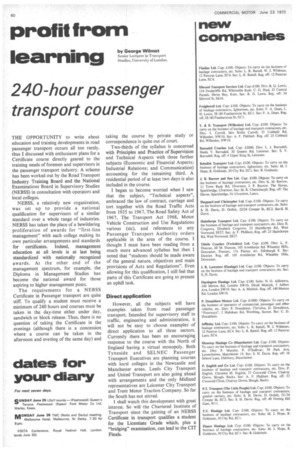profit from
Page 60

If you've noticed an error in this article please click here to report it so we can fix it.
learning by George Wilmot
Senior Lecturer in Transport Studies, University of London. Senior Lecturer in Transport Studies, University of London.
240-hour passenger transport course
THE OPPORTUNITY to write about education and training developments in road passenger transport occurs all too rarely. thus I discussed with enthusiasm plans for a Certificate course directly geared to the training needs of foremen and supervisors in the passenger transport industry. A scheme has been worked out by the Road Transport Industry Training Board and the National Examinations Board in Supervisory Studies (NEBSS) in consultation with operators and local colleges.
NEBSS, a relatively new organization, was set up to provide a national qualification for supervisors of a similar standard over a whole range of industries. NEBSS has taken the place of a bewildering proliferation of awards for "first-line management" with each college making its own particular arrangements and standards for certificates. Indeed, management education at all levels is at last being standardized with nationally recognized awards. At the other end of the management spectrum, for example, the Diploma in Management Studies has become the ' national award for those aspiring to higher management posts.
The requirements for a NEBSS Certificate in Passenger transport are quite stiff. To qualify a student must receive a minimum of 240 hours and courses must be taken in the day-time either under day, sandwich or block release. Thus, there is no question of taking the Certificate in the evenings (although there is a concession where a course can be taken in the afternoon and eveiting of the same day) and taking the course by private study or correspondence is quite out of court.
Two-thirds of the syllabus is concerned with Principles and Practice of Supervision and Technical Aspects with three further subjects (Economic and Financial Aspects; Industrial Relations; and Communication) accounting for the remaining third. A residential period of at least two days is also included in the course.
I began to become worried when I saw that the subject, "Technical aspects", embraced the law of contract, carriage and tort together with the Road Traffic Acts from 1935 to 1967, The Road Safety Act of 1967, The Transport Act 1968, Motor Vehicle Construction and Use Regulations various (sic), and references to any Passenger Transport Authority orders applicable in the area of the course. I thought I must have been reading from a much more advanced syllabus but then I noted that "students should be made aware of the general nature, objectives and main provisions of Acts and Regulations". Even allowing for this qualification, I still feel that parts of this Certificate are going to present an uphill task.
Direct application However, all the subjects will have examples taken from road passenger transport. Intended for supervisory staff in traffic, engineering and administration, it will not be easy to choose examples' of direct application to all three sectors. Currently there has been an encouraging response to the course with the North of England having a virtual monopoly. Both Tyneside and SELNEC Passenger Transport Executives are planning courses with local colleges in the Newcastle and Manchester areas. Leeds City Transport and United Transport are also going ahead with arrangements and the only Midland representatives are Leicester City Transport and Trent Motor Traction Company. So far the South has not stirred.
I shall watch this development with great interest. So will the Chartered Institute of Transport since the gaining of an NEBSS Certificate in transport qualifies a student for the Licentiate Grade which, plus a "bridging" examination, can lead to the CIT Finals.












































































































